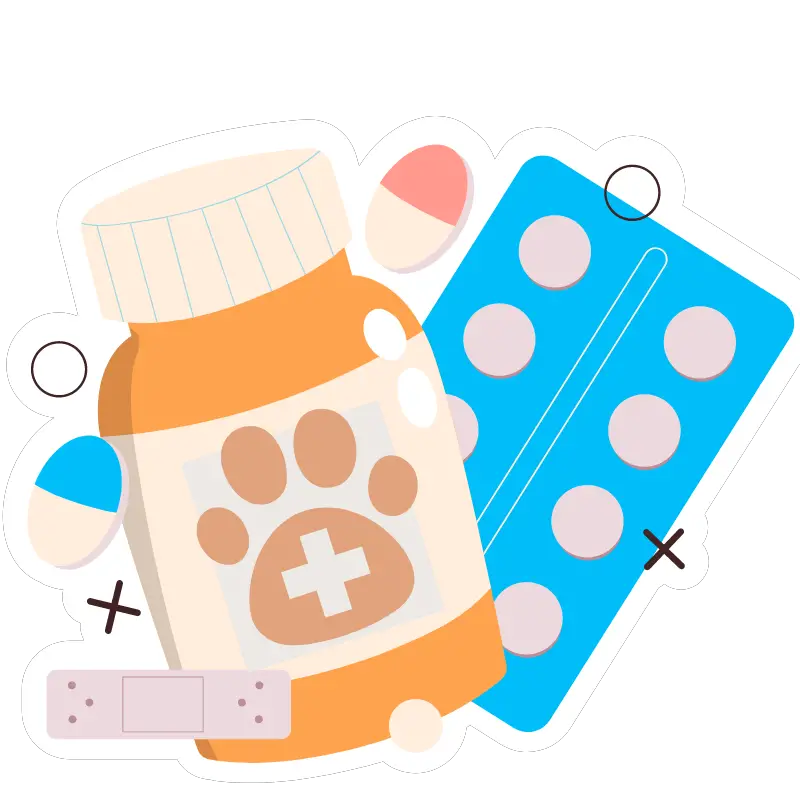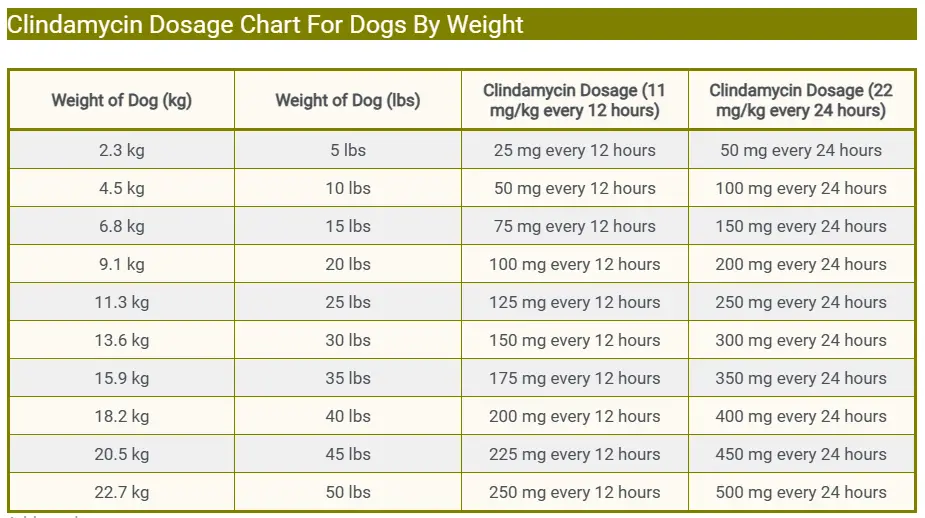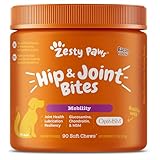The ideal dosage of Clindamycin for dogs to treat infected wounds, abscesses, and dental infections is 11 mg/kg (5 mg/lb) every 12 hours, or 22 mg/kg (10 mg/lb) every 24 hours orally. However, the dosage for treating other health conditions can vary depending on your pet’s health condition and the severity of the illness.
Clindamycin Dosage For Dogs

-
Ideal Dose: 11 mg/kg (5 mg/lb) every 12 hours.
-
Uses: Infected wounds, abscesses, and dental infections.
-
FDA Approved: Yes
-
Brand Names: Antirobe®, Cleocin®.
-
Variants: Capsule
-
Storage & Handling: Room Temperature.
-
Administration: Every 12 or 24hours.
Disclaimer: Self-medication can be hazardous. Please consult your veterinarian for personalized guidance on the appropriate dosage for your furry friend’s specific condition.
When our furry companions fall ill, it’s natural to seek out the best possible care to ensure their speedy recovery. Clindamycin, a broad-spectrum antibiotic, is commonly prescribed by veterinarians to treat various bacterial infections in dogs.
However, determining the correct dosage for our canine friends can be daunting without proper guidance.
In this comprehensive guide, we’ll delve into the nuances of Clindamycin dosage for dogs, providing pet owners with the knowledge they need to effectively and safely administer this crucial medication to their beloved pets.
Clindamycin Dosage For Dogs
The recommended dosage of clindamycin for dogs depends on their weight and the condition being treated. Typically, the dosage ranges from 11 mg/kg (5 mg/lb) of the dog’s body weight every 12 hours or 22 mg/kg (10 mg/lb) every 24 hours when administered orally.
However, it’s essential to follow your veterinarian’s prescription precisely, as they’ll consider factors like the dog’s health status and the specific infection being treated. Always consult a vet before administering any medication to your pet.
Clindamycin Dosage Chart For Dogs By Weight
| Weight of Dog (kg) | Weight of Dog (lbs) | Clindamycin Dosage (11 mg/kg every 12 hours) | Clindamycin Dosage (22 mg/kg every 24 hours) |
|---|---|---|---|
| 2.3 kg | 5 lbs | 25 mg every 12 hours | 50 mg every 24 hours |
| 4.5 kg | 10 lbs | 50 mg every 12 hours | 100 mg every 24 hours |
| 6.8 kg | 15 lbs | 75 mg every 12 hours | 150 mg every 24 hours |
| 9.1 kg | 20 lbs | 100 mg every 12 hours | 200 mg every 24 hours |
| 11.3 kg | 25 lbs | 125 mg every 12 hours | 250 mg every 24 hours |
| 13.6 kg | 30 lbs | 150 mg every 12 hours | 300 mg every 24 hours |
| 15.9 kg | 35 lbs | 175 mg every 12 hours | 350 mg every 24 hours |
| 18.2 kg | 40 lbs | 200 mg every 12 hours | 400 mg every 24 hours |
| 20.5 kg | 45 lbs | 225 mg every 12 hours | 450 mg every 24 hours |
| 22.7 kg | 50 lbs | 250 mg every 12 hours | 500 mg every 24 hours |
The above Antirobe®, Cleocin® Clindamycin dosage chart for dogs by weight is provided for educational purposes only and should not substitute for veterinary advice. Always start with the minimum dose until your veterinarian prescribes an increase in dosage.
Related Post: Apoquel Dosage For Dogs
Clindamycin Uses in Dogs
-
Skin Infections: Treats pyoderma, folliculitis, and cellulitis.
-
Dental Infections: Addresses periodontal disease and dental abscesses.
-
Bone Infections: Targets osteomyelitis caused by bacteria.
-
Respiratory Infections: Effective against pneumonia and bronchitis.
-
Soft Tissue Infections: Treats abscesses and infected wounds.
-
Toxoplasmosis: May be used in certain cases.
Related Post: Prednisone Dosage For Dogs
Clindamycin Side Effects in Dogs
-
Gastrointestinal Upset: Vomiting, diarrhea, and loss of appetite are common.
-
Allergic Reactions: Dogs may experience itching, hives, or swelling of the face, lips, or tongue.
-
Liver Toxicity: Rarely, clindamycin can cause liver damage, leading to jaundice and abnormal liver function.
-
Blood Disorders: Rare cases of decreased white blood cell count (neutropenia) or decreased platelet count (thrombocytopenia) have been reported.
-
Esophageal Irritation: If the medication is not given with food or water, it may cause irritation to the esophagus.
-
Overgrowth of Non-Susceptible Bacteria: Prolonged use can lead to the overgrowth of bacteria not susceptible to clindamycin, potentially causing secondary infections.
-
Gastrointestinal Inflammation: In severe cases, clindamycin can cause inflammation of the gastrointestinal tract, leading to colitis or enteritis.
Which Dogs Should Not Take Clindamycin.
Canines with the following health issues should not take Clindamycin Antirobe®, Cleocin® without veterinary recommendations.
-
Canines with a history of allergic reactions to clindamycin or other antibiotics in the lincosamide class.
-
Dogs with a history of severe gastrointestinal issues or inflammatory bowel disease, as clindamycin can exacerbate these conditions.
-
Puppies with liver disease or dysfunction, as clindamycin can potentially worsen liver function.
-
Pregnant or nursing dogs, unless the potential benefits outweigh the risks and under the guidance of a veterinarian.
-
Dogs with a known sensitivity to any of the inactive ingredients in clindamycin formulations.
FAQs
Can I give my dog Clindamycin without consulting a veterinarian?
It’s not recommended to administer any medication to your dog without consulting a veterinarian first. Your vet can determine the appropriate dosage and monitor for any potential side effects.
How long does it take for Clindamycin to start working in dogs?
The onset of action of Clindamycin can vary depending on the type and severity of the infection. In some cases, improvement may be seen within a few days, while more severe infections may require longer treatment durations.
What should I do if my dog experiences side effects from Clindamycin?
If your dog experiences any adverse reactions to Clindamycin, such as vomiting, diarrhea, or allergic symptoms, contact your veterinarian immediately for guidance.
Can Clindamycin be used to treat all types of infections in dogs?
Clindamycin is effective against many bacterial infections commonly seen in dogs, but it may not be appropriate for all types of infections. Your veterinarian will determine the most suitable treatment based on the specific infection and your dog’s individual health needs.
Is it safe to give Clindamycin to pregnant or nursing dogs?
Clindamycin should be used with caution in pregnant or nursing dogs, as its safety in these situations has not been thoroughly studied. Your veterinarian can provide guidance on the risks and benefits of using Clindamycin in these cases.










![Can Dogs Eat Blood? 7 Side Effects [Expert Opinion]](https://petskor.com/wp-content/uploads/2022/04/Webp.net-resizeimage-12.jpg)
